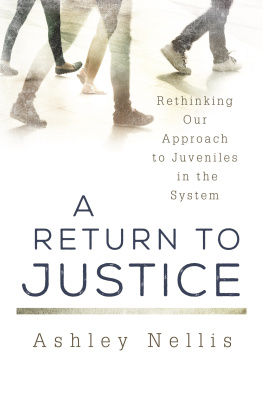
Due Process Protections for Youth
This monograph illuminates the connections between juvenile defense policies and the racially disparate impact of the juvenile justice system. The limited data that exist on youth in the juvenile justice system consistently depict disparate contact and outcomes for Black youth across the system. The broad rehabilitative goals of the US juvenile justice system, along with the best interest legal standard of the child welfare system, muddle the protection of youth due process rights. States differ widely in their policies granting defense counsel, and many policies lack specific language for policies addressing notions such as appointment timing, duration of representation, waiver criteria, and role of counsel.
Using a combination of legal and sociological research methods, this book examines the lack of specificity in the language of juvenile defense policies and connects the dots between this deficiency with the racially disparate impact of the system, contextualizing findings within broader theoretical constructs of race and law. The author introduces common elements of juvenile defense policies, describes their impact, and makes suggestions for strengthening defense counsel policies. The book concludes with a call to action regarding expanded data-collection practices for juvenile delinquency courts.
This book is essential reading for those engaged in youth and juvenile justice efforts and scholars interested in issues surrounding due process, race, class, social policy, and justice.
Emily K. Pelletier is an Assistant Professor at Queensborough Community College, City University of New York. She teaches in the areas of criminal justice, political science, and children and youth studies. Prior to teaching, Emily worked with several nonprofit organizations on policy-advocacy for juvenile justice reforms, including the National Juvenile Defender Center. Juvenile justice remains her primary area of research and legislative interest. Emily holds a Ph.D. in Criminal Justice from John Jay College/The Graduate Center at the City University of New York, a Juris Doctorate from the University of Maine, a Masters in Public Policy and Management from the University of Southern Maine, and a Bachelors in Comparative Literature and American Studies from Hobart and William Smith Colleges.
Routledge Studies in Juvenile Justice and Delinquency
Series editor David L. Myers
Juvenile justice matters are of critical concern in both the United States and around the world. Books in the Routledge Studies in Juvenile Justice and Delinquency series explore mechanisms, consequences, insights, and innovations in the field of juvenile justice and its responses to delinquency. Each monograph will examine new areas of empirical and theoretical inquiry, provide an agenda-setting discussion of important concepts and controversies surrounding juvenile justice and delinquency, and seek to encompass a transnational or global approach to the issues addressed. The series will be a resource for the international community of undergraduates, post-graduates, researchers, practitioners, and policymakers concerned with juveniles and families caught up in or at risk of engagement in delinquency and justice system involvement.
Contextual Characteristics in Juvenile Sentencing
Examining the Impact of Concentrated Disadvantage on Youth Court Outcomes
Rimonda Maroun
Due Process Protections for Youth
Defense Counsel Policies and Disparity in the Juvenile Justice System
Emily K. Pelletier
Due Process Protections for Youth
Defense Counsel Policies and Disparity in the Juvenile Justice System
Emily K. Pelletier
First published 2020
by Routledge
52 Vanderbilt Avenue, New York, NY 10017
and by Routledge
2 Park Square, Milton Park, Abingdon, Oxon, OX14 4RN
Routledge is an imprint of the Taylor & Francis Group, an informa business
2020 Taylor & Francis
The right of Emily K. Pelletier to be identified as author of this work has been asserted by her in accordance with sections 77 and 78 of the Copyright, Designs and Patents Act 1988.
All rights reserved. No part of this book may be reprinted or reproduced or utilised in any form or by any electronic, mechanical, or other means, now known or hereafter invented, including photocopying and recording, or in any information storage or retrieval system, without permission in writing from the publishers.
Trademark notice: Product or corporate names may be trademarks or registered trademarks, and are used only for identification and explanation without intent to infringe.
Library of Congress Cataloging-in-Publication Data
Names: Pelletier, Emily K., author.
Title: Due process protections for youth : defense counsel policies and disparity in the juvenile justice system/ Emily K. Pelletier.
Description: New York : Routledge, 2019. | Series: Routledge studies in juvenile justice and delinquency | Includes bibliographical references and index.
Identifiers: LCCN 2019036880 (print) | LCCN 2019036881 (ebook) | ISBN 9780367002015 (hardback) | ISBN 9780429400773 (ebook)
Subjects: LCSH: Juvenile justice, Administration ofUnited States. | ChildrenLegal status, laws, etc.United States. | Due process of lawUnited States. | Juvenile delinquencyUnited States.
Classification: LCC KF9779 .P45 2019 (print) | LCC KF9779 (ebook) | DDC 345.73/08dc23
LC record available at https://lccn.loc.gov/2019036880
LC ebook record available at https://lccn.loc.gov/2019036881
ISBN: 978-0-367-00201-5 (hbk)
ISBN: 978-0-429-40077-3 (ebk)
Typeset in Sabon
by Apex CoVantage, LLC
Contents
This monograph would not be possible without the decades of work by the National Juvenile Defender Center. I have immense gratitude for the entire National Juvenile Defender Center community, including Patti Puritz, MaryAnn Scali, Chris Northop, and especially Tim Curry, who generously provided feedback on a very early version of this project. Thank you to Jeremy Porter, Lucia Trimbur, and Jeff Butts for sharing your expertise of quantitative methodology, critical race theory, and the juvenile justice system, respectively. Nicole DiGeronimo and Doug Evansthank you for your assistance and guidance with this project. All my thanks to you all.
In the United States, the juvenile justice system addresses delinquent behavior by youth and operates separately from the adult criminal justice system. Each state maintains its own legal code for the jurisdiction and implementation of the juvenile justice system, but most states have similar structures and procedures for addressing delinquent behavior. The juvenile justice system in the United States has a history of rehabilitative rhetoricestablished by the Child Savers in the late 1800sthat distinguishes the juvenile justice system from the adult criminal justice system (Platt, 1969). The rehabilitative language of the initial state juvenile justice systems offers a starting point for identifying divergences from the rehabilitative ideal at the inception of the juvenile justice system and as it continuously develops, often exhibiting the punitive characteristics of the adult criminal justice system.






